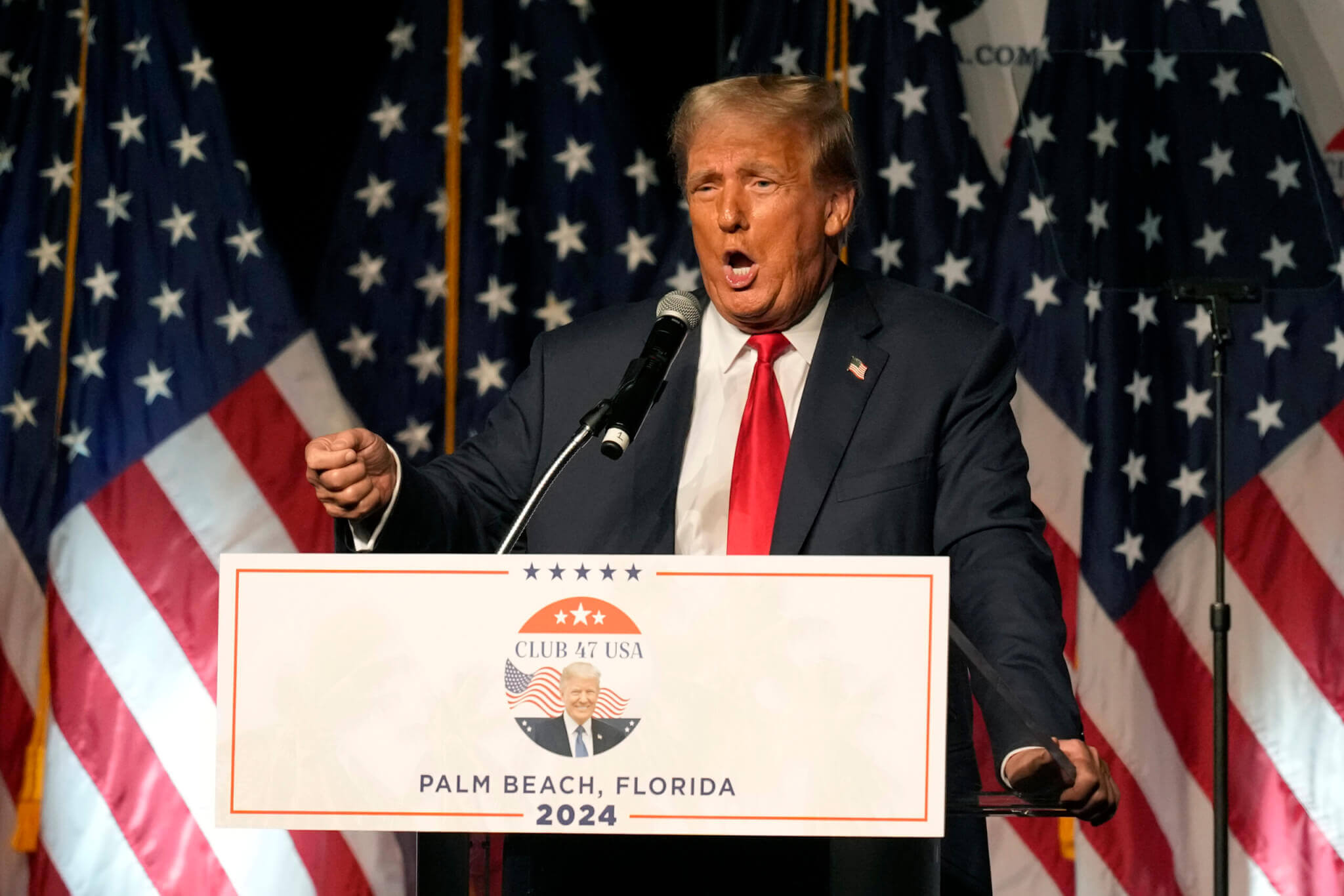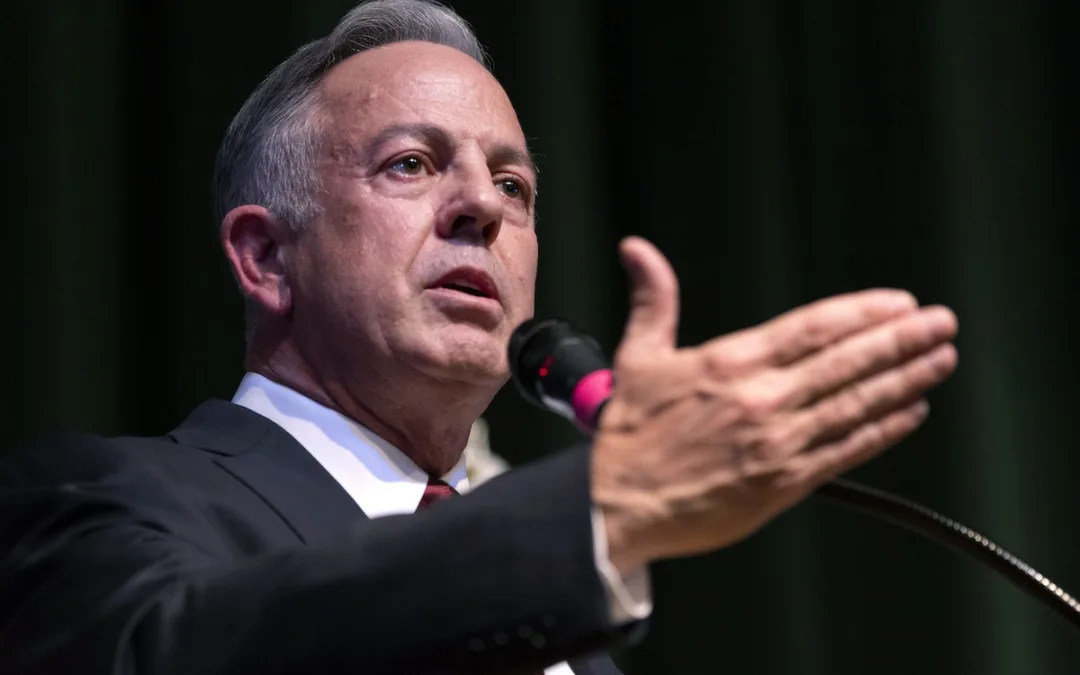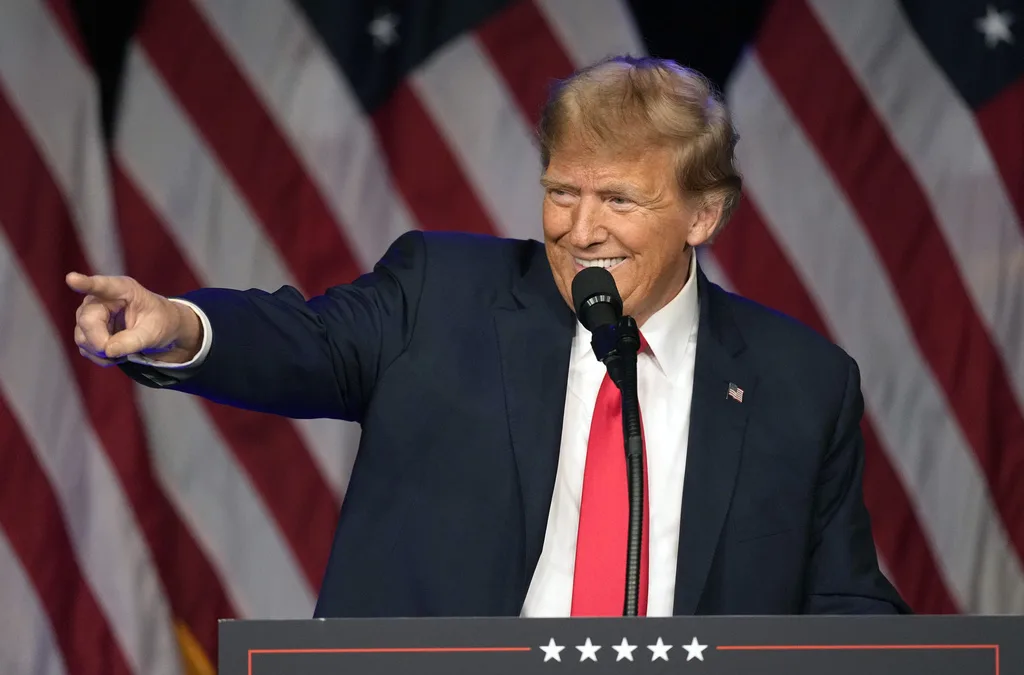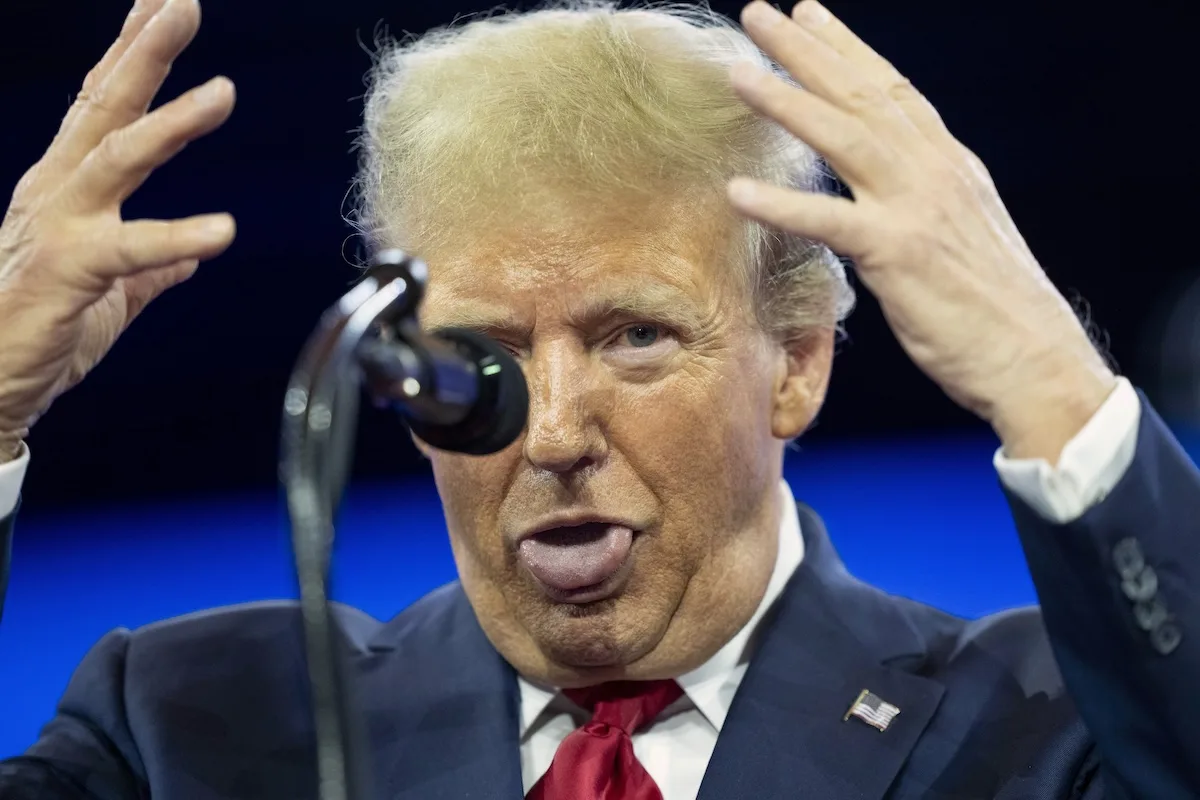
In recent months, Donald Trump has called for the execution of a US military official, mocked the assault of an 83-year-old man, used rhetoric that echoes Hitler’s Mein Kampf, and verbally attacked prosecutors and judges. (AP Photo/Rebecca Blackwell)
Donald Trump continues to run away with the 2024 Republican presidential primary and appears to have a coin flip’s chance at winning the presidency again next November.
That makes his increasingly violent rhetoric and reckless behavior all the more significant, revealing what a second Trump term might look like.
Here are five recent examples of Trump’s growing extremism that you might’ve missed:
Called for the Execution of a US Military Leader
Last month, the Atlantic published a profile detailing how retiring Joint Chiefs Chairman Gen. Mark Milley navigated the Trump presidency.
In the piece, Milley looked back at the four-year term of the former president, and was “philosophical” about his service. During Milley’s tenure, the US military finally pulled out of Afghanistan, was increasingly challenged by China, and helped arm and train Ukrainian forces to defend themselves against the Russian invasion.
What’s also mentioned is the fact that Milley made the decision in 2020 to say–more than once–that the US military would have “zero role” to play in that year’s presidential election.
“I wanted to make sure it was clear to the American people, to our adversaries, to our friends and allies overseas, but also to our own force, to us, wearing the uniform, that we have zero, and I mean, zero role in US electoral politics,” Milley said during an interview with NBC News’ Lester Holt.
In response to the profile, Trump accused Milley of “treasonous” actions. The former president also seemed to imply that Milley should be executed.
“This is an act so egregious that, in times gone by, the punishment would have been DEATH!” Trump posted on Truth Social, referring to Milley’s reassurance to his Chinese counterpart in the days after the Jan. 6 attack that the US would not attack China.
Milley has since said he has “appropriate measures” to ensure his safety in response to the former president’s comments. The general also said he stood by his comments made to China, and implied that Trump disrespected the military with his comments.
“As much as these comments are directed at me, it’s also directed at the institution of the military. And there are 2.1 million of us in uniform,” Milley told CBS. “And the American people can take it to the bank, that all of us, every single one of us, from private to general, are loyal to that Constitution and will never turn our back on it no matter what. No matter what the threats, no matter what the humiliation, no matter what.”
Said Migrants Are “Poisoning the Blood of Our Country”
Donald Trump is no stranger to making disparaging comments about migrants, as evidenced by his remarks made on the very day he launched his first presidential campaign in 2015, when he called them “rapists.”
But Trump’s most recent comments evoke language that’s been used to dehumanize and eradicate minority groups in the not so distant past.
During a recent interview with National Pulse, a conservative media publication, Trump said the following about migrants entering the United States:
“Nobody has any idea where these people are coming from, and we know they come from prisons. We know they come from mental institutions and insane asylums. We know they’re terrorists. Nobody has ever seen anything like we’re witnessing right now. It is a very sad thing for our country. It’s poisoning the blood of our country. It’s so bad, and people coming in with disease. People are coming in with every possible thing that you could have.”
Trump’s rhetoric about migrants “poisoning the blood of our country,” echoes Hitler’s Nazi propaganda used against immigrants, Jewish people, and interracial families.
In Chapter 11 of Hitler’s autobiographical manifesto Mein Kampf, titled “Nations and Race,” the dictator wrote that “all great cultures of the past perished only because the originally creative race died out from blood poisoning.”
Mocked a Potentially Fatal Assault on a Congressional Spouse
Last year, Paul Pelosi, the husband of former Speaker of the House Nancy Pelosi, was attacked in the couple’s San Francisco home in the middle of the night.
David DePape, his alleged attacker, was charged with six counts relating to the attack, including attempted murder, burglary, assault, false imprisonment, and threatening the family member of a public official. He has pleaded not guilty to all charges.
Audio and video of the attack was released earlier this year. Police body camera footage depict the moment of the attack and DePape’s police interview where he admitted he wanted to hold the then-House speaker hostage.
DePape is shown lunging toward Paul Pelosi, who was struck in the head with a hammer, although the actual blow is shown off camera. Pelosi can be seen lying face down on the floor in his pajama top and underwear. Officers later said he woke up in a pool of his own blood.
Pelosi survived the attack, but was left with severe arm and head injuries, including a fractured skull.
Last month, Trump mocked the former House Speaker and her husband.
“We’ll stand up to crazy Nancy Pelosi, who ruined San Francisco — how’s her husband doing, anybody know?” Trump said to a crowd of California Republicans at a state party convention. “And she’s against building a wall at our border, even though she has a wall around her house — which obviously didn’t do a very good job.”
Trump’s comments amount to some of the most brazen he’s made regarding the attack of Paul Pelosi, who turned 83 in April. Trump has also stoked far-right conspiracies surrounding the assault.
Allegedly Discussed US Nuclear Subs With a Foreign National After Leaving Office
Trump allegedly discussed potentially sensitive information regarding US nuclear submarines with a member of his Mar-a- Lago club, including an Australian billionaire named Anthony Pratt, who went on to share the information with “at least” 45 other people, according to an ABC News report from earlier this month. These people included more than a dozen foreign officials, several of his own employees, and a handful of journalists.
Prosecutors and FBI agents have twice this year interviewed Pratt, who runs Pratt Industries, one of the world’s largest packaging companies. Pratt confirmed that he was the one who brought up the American submarine fleet, which he said he and the former president had spoken about before.
According to Pratt’s account, as described by sources, he told Trump that Australia should start buying its submarines from the United States. In response, Trump told Pratt two pieces of information regarding US submarines: the supposed exact number of nuclear warheads they routinely carry, and exactly how close they supposedly can get to a Russian submarine without being detected.
Pratt apparently told investigators that he couldn’t tell whether the former president was being serious or not, and it’s unclear, also according to ABC News, whether the information Trump relayed was accurate.
Special Counsel Jack Smith did not include any details about this alleged 2021 conversation between the two men in his June indictment against the former president, but the information was relayed to his team as the information could shed light on Trump’s handling of other sensitive government information.
Made Objectionable Comments About Those Involved in His Prosecution
Trump also hasn’t slowed down on his name-calling or violent rhetoric against perceived political opponents.
He labeled New York Attorney General Letitia James, who’s suing the former president for fraudulently inflating his wealth and assets on financial records, a “racist” and a “monster” on his social media platform Truth Social.
Trump has also attacked Special Counsel Jack Smith, who is prosecuting Trump in both the Jan. 6 and classified documents cases. In the former, Trump is accused of mounting “a wide-ranging campaign to subvert Joe Biden’s victory in the presidential election.” In the latter, Trump is accused of illegally leaving the White House with classified information “regarding defense and weapons capabilities of both the United States and foreign countries; United States nuclear programs; potential vulnerabilities of the United States and its allies to military attacks; and plans for possible retaliation in response to a foreign attack.”
The former president has called Smith “deranged” and a “psycho” and said he “looks like a crackhead.”
While attending the first day of his civil fraud trial earlier this month, Trump attacked the judge who will determine the fate of his business empire: Manhattan Supreme Court Justice Arthur Engoron.
The former president called for the judge to be disbarred, thrown out of office, and criminally prosecuted; Engoron ruled that Trump committed fraud by inflating his wealth and assets on financial records.
Trump’s anger, both online and in court, has implications beyond his own court cases and public opinion. The federal prosecutors overseeing the indictment of Trump in the Jan. 6 case, for example, asked a judge in August to impose a protective order over the discovery evidence in the case. They cited a threatening message that the former president had posted on social media.
“IF YOU GO AFTER ME, I’M COMING AFTER YOU!” Trump wrote on Truth Social.
On Monday, the judge in Trump’s case related to his efforts to overturn the 2020 election issued a limited gag order on Trump, legally barring him from verbally attacking Smith or his team, witnesses, or court staff involved in the case. Judge Tanya Chutkan said she would assess any “sanctions” for Trump if and when he violates the order.

Gov. Joe Lombardo’s campaign accepted major donations from corporations last year
Several wealthy individuals used multiple businesses to give more money to the governor’s campaign than the legal limit would have allowed them to...

Biden campaign opens new east Las Vegas office
The office is in the heart of one of Las Vegas’ largest Latino communities, and marks the fifth Biden-Harris office operating in Nevada this...

Video: Women for Biden-Harris

Inicia registro de candidaturas en los condados Clark y Washoe
El período de presentación de candidatos para cargos no judiciales en el Condado Clark comenzó el lunes 4 de marzo y durará hasta el viernes 15 de...

Dio inicio campaña “Mujeres por Biden-Harris” en Las Vegas
“Donald Trump es peligroso para las mujeres”: Jill Biden en Las Vegas. La primera dama Jill Biden instó a las mujeres de Nevada a reelegir a su...

Report: Trump’s policies hurt Nevadans’ health and the environment
A recent report from the advocacy organization Climate Power details how the policies implemented during former president Donald Trump’s time in the...




